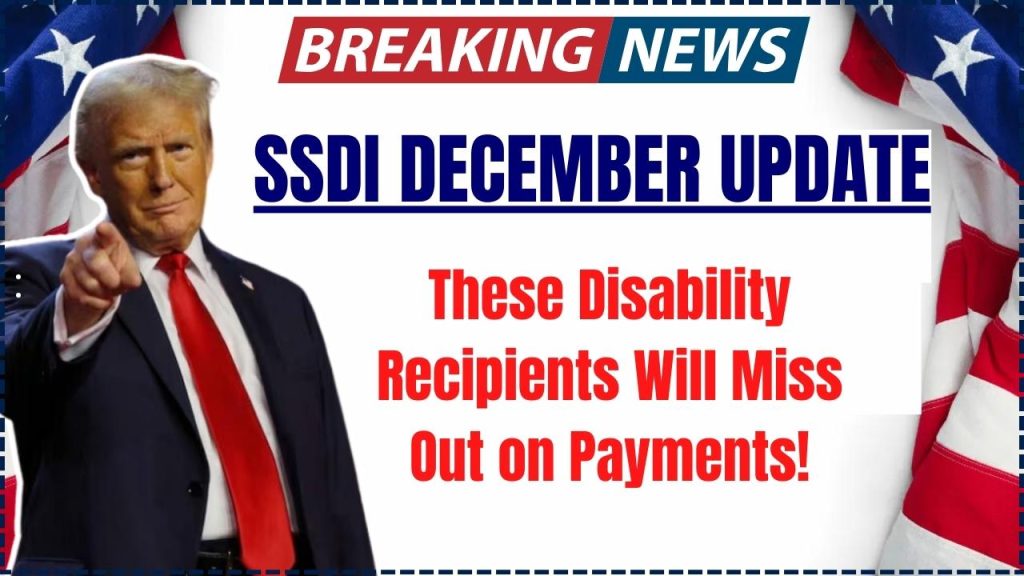
SSDI December Update: For millions of Americans, Social Security Disability Insurance (SSDI) is a lifeline, providing monthly financial support for essential expenses like housing, food, and healthcare. However, as December unfolds, some beneficiaries may face disruptions in their payments due to common issues such as incorrect information or processing delays. Understanding these factors and preparing in advance can help ensure you receive your benefits on time.
SSDI December Update
SSDI benefits are a lifeline for millions of Americans, particularly during the holiday season. By staying informed about payment schedules, promptly updating your information, and leveraging available resources, you can ensure uninterrupted access to these critical funds. If you encounter issues, don’t hesitate to reach out to the SSA or seek support from advocacy organizations.
| Aspect | Details |
|---|---|
| Payment Dates | December 11, 18, and 25, 2024 |
| Potential Issues | Incorrect banking info, address changes, unreported income |
| Action Steps | Verify personal info, report changes, contact SSA for support |
| SSA Contact Info | Social Security Administration |
What Are SSDI Payments?
Social Security Disability Insurance (SSDI) is a federal program that provides monthly benefits to individuals who are unable to work due to a qualifying disability. These payments are vital for maintaining a basic standard of living, covering everything from medical expenses to utility bills.
Key Features of SSDI:
- Funded through payroll taxes.
- Payments are based on your work history and prior earnings.
- Designed to support individuals with long-term disabilities.
December 2024 SSDI Payment Schedule
SSDI payments for December 2024 will be issued based on beneficiaries’ birth dates:
- Second Wednesday (December 11, 2024): Recipients born on the 1st to 10th of any month.
- Third Wednesday (December 18, 2024): Recipients born between the 11th and 20th.
- Fourth Wednesday (December 25, 2024): Recipients born from the 21st to the 31st.
Note: December 25 is a federal holiday. While the Social Security Administration (SSA) typically adjusts payments scheduled on holidays, no changes have been announced for this year. Beneficiaries should monitor SSA updates closel
Common Reasons for Missed SSDI Payments
While the SSA works diligently to distribute payments on time, several issues can cause delays:
- Incorrect Banking Information
- If your bank account or routing number is outdated or incorrect, direct deposits may fail.
- Unreported Address Changes
- Paper checks sent to old addresses can result in missed payments.
- Unreported Income Changes
- Failing to notify the SSA of increased earnings may lead to eligibility issues or payment holds.
- Processing Delays
- Bank holidays, technical issues, or high processing volumes during the holiday season can slow payment distribution.
- Overpayment Recovery
- If you’ve been overpaid in previous months, the SSA may withhold payments to recover the funds.
Steps to Ensure You Don’t Miss Your SSDI December Update
To avoid missing your SSDI payment, follow these essential steps:
1. Verify Your Information
- Ensure your banking details (account and routing numbers) are up-to-date.
- Check your mailing address if you receive paper checks.
2. Report Changes Promptly
- Notify the SSA of any income changes, address updates, or significant life events (e.g., marriage, divorce).
3. Set Up Direct Deposit
- Direct deposit is faster and more reliable than paper checks. Update your payment preferences through your My Social Security account.
4. Track Payment Dates
- Mark the SSDI payment schedule on your calendar to anticipate when funds should arrive.
5. Contact SSA for Support
- If you don’t receive your payment within three business days of the scheduled date, call the SSA at 1-800-772-1213 or visit your local office.
Impact of Missed SSDI Payments
Missing an SSDI payment can have significant consequences, including:
- Difficulty Meeting Essential Expenses: Rent, utilities, and groceries may go unpaid.
- Increased Financial Stress: Recipients relying solely on SSDI may face mounting stress from overdue bills.
- Disrupted Medical Care: Payments often cover healthcare needs, and delays can impact access to medications or treatments.
Tips for Staying Prepared
- Create a Financial Buffer
- Save a portion of your benefits each month to build an emergency fund.
- Set Up Alerts
- Enable notifications with your bank to confirm deposits immediately.
- Keep a Checklist
- Regularly review and update personal and financial information with the SSA.
- Monitor SSA Announcements
- Stay informed about potential changes to payment schedules or program requirements by checking the SSA website.
Resources for Additional Support
If you experience issues with your SSDI payments, these resources can help:
- Social Security Administration
- Website: ssa.gov
- Phone: 1-800-772-1213
- National Disability Rights Network (NDRN)
- Offers advocacy and legal support for individuals with disabilities.
- Website: ndrn.org
- Community Assistance Programs
- Local nonprofit organizations may provide short-term financial aid for housing, food, or medical expenses.
Real-Life Stories: The Importance of SSDI Payments
Maria’s Story:
Maria, a single mother with a chronic illness, relies on SSDI to cover her son’s school fees and monthly prescriptions. Last year, a payment delay due to incorrect bank details caused her to miss rent. After updating her information, Maria now receives direct deposits on time.
James’ Experience:
James, a retired veteran with disabilities, missed his December payment when he moved to a new address. By contacting the SSA and setting up direct deposit, he resolved the issue and avoided future disruptions.
Average Payments for SSI, SSDI, and Retirement in 2024 – Social Security’s Big Update
December SSDI Payment Dates Released – Check Your Schedule with SSA
Social Security Disability Payments Are Changing—US Government Confirms Updates!
Frequently Asked Questions (FAQs)
Q1: Can I track my SSDI payment?
A1: Yes, you can monitor your payments through the My Social Security portal or by contacting the SSA.
Q2: What happens if my payment date falls on a holiday?
A2: Payments are typically issued on the preceding business day. Check SSA announcements for any changes.
Q3: How long does it take to resolve a missed payment?
A3: Resolution times vary, but most issues are addressed within 5–7 business days after reporting.
Q4: Can my SSDI benefits be garnished?
A4: In most cases, SSDI benefits cannot be garnished, except for child support, alimony, or federal debts.
Q5: Are SSDI benefits taxable?
A5: SSDI benefits may be taxable if your combined income exceeds the IRS threshold. Consult a tax professional for guidance.






